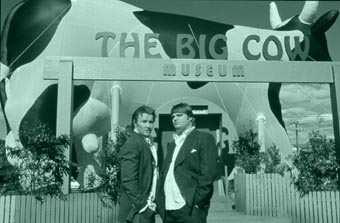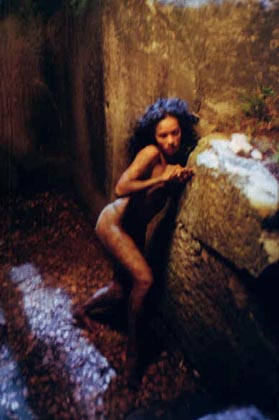SEEN
Liz Bradshaw, Simon Enticknap, Keith Gallasch, Keith Gallasch, Barbara Karpinski
Storytelling
Liz Bradshaw
Foucault, I think, makes it clear that the exercise of power turns every/man into a despot; that there is no such thing as consent. Solondz agrees. Storytelling is nuanced, visceral filmmaking on the interdependence of racism and misogyny. The two vignettes expose the ugly corollary of ‘freedom and democracy’ rhetoric in all its brutal grotesquery. Sophisticated commentary on the American nightmare, and the truth/fiction ruse.
Writer/Director Todd Solondz, distributor Roadshow, currently screening nationally.
The Hard Word
Simon Enticknap

Hard Word
This should really be called The Hard Work in recognition of the tremendous effort put in by all involved; the actors act like actors, the cinematographer films away from beginning to end, the sound man delivers the sound loud and clear, wardrobe and make-up make well-considered contributions, even the stunt team puts in with some neat driving and tumbling. Everybody pulls together, plays their part. It’s a team effort, a tribute to the skill and craftsmanship of the local film industry. All that hard work, all that dedication to the task and still the damn thing just sits there, refuses to fly, take wing, soar above the collective perspiration and professionalism of those who made it. A turkey is a turkey is a turkey.
It feels like a script that doesn’t cohere, leaving great gaps in its credibility without summoning up enough energy to make us leap those gaps. The characters are ‘characters’ sewn together from cast-off characteristics; crims with consciences, corrupt cops with none, a sleazy lawyer and a sultry dame. There are too many scenes in which lines are batted back and forth like ping-pong balls—all veiled menace and double-crossing entendre—and just about as exciting. Still, it’s filmed in Sydney and Melbourne so there is plenty to look at, and it’s a great film for spot the actor: Paul Sonkilla plays a cop, Kim Gyngell plays a crim. It’s lovely to see. There are some curious interludes too, such as a couple of male fantasy relationships between 2 of the criminals and women (a female prison psychologist and kidnap victim) that go nowhere and contribute little—so why are they there? Gratuitous or what?
Much of the pre-release publicity with The Hard Word focused on the ‘return home’ of Australian actors (Guy Pearce, Rachel Griffiths) who have worked overseas. This draws inevitable comparisons between the American way of doing things and the Australian way, and perhaps alludes to a wider anxiety about a loss of identity; Australia being seen as little more than an exotic location, an inexpensive Hollywood sound-stage. In the film itself, there is a constant urge to assert a certain Australian-ness; indeed, what defines it as Australian more than anything is this need to define itself as Australian. The conservative nature of this identity reveals itself in the rather time-locked feel to the film, drawing on a pre-Wood Royal Commission era of hardmen and brutal killings, an Australia of Big Things and Kellyesque gangs, larrikin humour and lots of red meat.
Writer/director Scott Roberts, distributor Roadshow, currently screening nationally.
No Surrender
Keith Gallasch

Bernadette Walong, No Surrender
In a dramatic reversal of one of cinema’s favorite tropes, the pursuit of the terrified woman, the subject of No Surrender’s gaze, an Indigenous woman (dancer Bernadette Walong), wakes to find a camera (our point of view) prying between her thighs. A violent chase ensues, rich in night time colour, strange locations and hand-held urgency until the woman’s spirit is unleashed in an ecstatic dance. She turns on the camera with fists, kick-boxing knockouts and flame, the shattered lens flickering to faltering readouts. No Surrender exploits digital possibilities to the painterly max with slo-mo strokes, sudden zooms and deft super-impositions. In a cinema with wrap-around sound, as at the Popcorn Taxi Sydney premiere, music and sound design stunningly amplify the immersive quality of the cinematography. It’s a rare experience for the audience being cast as the baddy. No Surrender won Best Experimental Film at the 2002 Annual ATOM Awards for Film, Television; Radio & Multimedia, has been shown on ABC TV, and has been selected to screen at the 2002 TTV Performing Arts on Screen in Riccione, Italy, and the Commonwealth Film Festival in Manchester, England.
Writer/choreographer/director Richard James Allen, composer Michael Yezerski, sound designer Liam Price, director of photography Andrew Commis, editor Karen Pearlman. The Physical TV Company in association with the Australian Broadcasting Corporation. 12 minutes.
Baise-Moi
Barbara Karpinski
A post-punk, part-porn splatter movie. Baise-Moi, roughly translated, means ‘Fuck Me.’ Vilified by the French, first-time director Virginie Despentes was not deterred. Baise-Moi is the collaboration of visceral ex-porn star actors and Eurotrash underground voices. If raw, uncut, bleeding and not so prurient pussy terrifies you, keep your pusillanimous self at home and watch store-bought porn where all the chicks are much more obedient, and blonde. Go girls go.
Writer/Directors Virginie Despentes, Coralie Trinh Thi, distributor Potential Films, banned after initial release in Australia.
RealTime issue #49 June-July 2002 pg. 18






